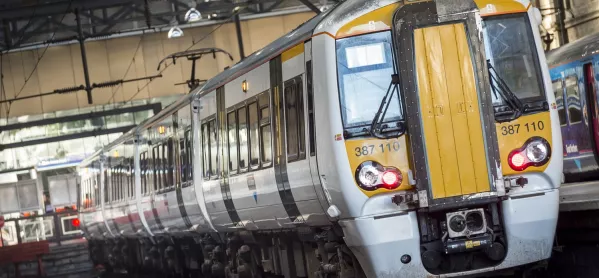- Home
- Want to see FE excellence? It’s all in a train journey
Want to see FE excellence? It’s all in a train journey

Eight hours 48 minutes. You can fly from London to Delhi in the same time (and I have), but that’s how long the cross-country train from Plymouth to Edinburgh takes.
I was in the Southwest for a meeting and I like travelling by train, so I decided to make one of the UK’s longest direct train journeys back home to Edinburgh (bonus points to any reader who’s done Aberdeen to Penzance).
It’s a train journey with some truly beautiful views, my favourite sections being along the coast from Plymouth to Exeter and Newcastle to Berwick-upon-Tweed, with the chance to glimpse the Angel of the North, too, if you’re quick. It’s also a train journey with colleges at pretty much every stop along the line, colleges that I’ve visited to discuss international work.
More on this: Why colleges are so much more than a 'second-chance saloon'
Opinion: 'Our doors must be open to international students'
More news: MPs make the case for FE funding in Westminster debate
Across country lines
At the Sheffield College, I ate at a college restaurant for the first time, and at Derby College, I attended a skills conference in the world’s oldest locomotive roundhouse. I’ve been welcomed and impressed by colleges everywhere along the cross-country line from York to Cheltenham and Burton to Durham.
As I looked out of the train window at the ever-changing landscape, I saw how fundamental it is to have a network of colleges that serve our different local communities, right across the country. How important it is that students can access college, and how colleges play a vital role in teaching and supporting students once they’re enrolled.
Our colleges, whether based in town or country, welcome thousands of students each year, including international students. We’re fortunate to have a college sector that can offer international students so much choice over location and experience. However, it can be harder for some regions to attract international students, when it is much more important for reasons of culture and diversity that they are able to do so.
International projects
Some colleges really need international projects, exchanges and students as they operate in regions that are quite monocultural, and they want to offer their students and staff exposure to other cultures. But these regions don’t always receive the promotion or exposure that they need. Last autumn the All Party Parliamentary Group (APPG) for International Students discussed regional diversity in its report into a sustainable future for international students in the UK. The report concluded that the UK needs a strategy to support a positive future for international students across all regions of the UK.
This spring, the UK government launched its new international education strategy. I welcome the strategy because it recognises the value of each segment of the UK international education sector; from skills and colleges through to education technology, English language teaching, higher education and schools. The UK has much more to offer internationally by galvanising all the different bits of our education system than by simply hoping the rest of us can ride on the coat-tails of universities. That’s why I’m also pleased the strategy includes some actions that I hope will help more colleges who want to get involved in international work. Indeed, it hasn’t always felt like there has been much help available, only obstacles to overcome.
For colleges, the new international education strategy can be truly successful in its implementation if we promote the strengths of colleges right across the country. We need to hear about the specialisms and good work that colleges do, provide evidence of this work and tell the story about it overseas. We also need better data that shows our contribution, on a national and a regional level. It’s time we asked the world to #LoveOurColleges, from coast to coast.
Emma Meredith is international director at the Association of Colleges
Register with Tes and you can read two free articles every month plus you'll have access to our range of award-winning newsletters.
Keep reading with our special offer!
You’ve reached your limit of free articles this month.
- Unlimited access to all Tes magazine content
- Save your favourite articles and gift them to your colleagues
- Exclusive subscriber-only stories
- Over 200,000 archived articles
- Unlimited access to all Tes magazine content
- Save your favourite articles and gift them to your colleagues
- Exclusive subscriber-only stories
- Over 200,000 archived articles


